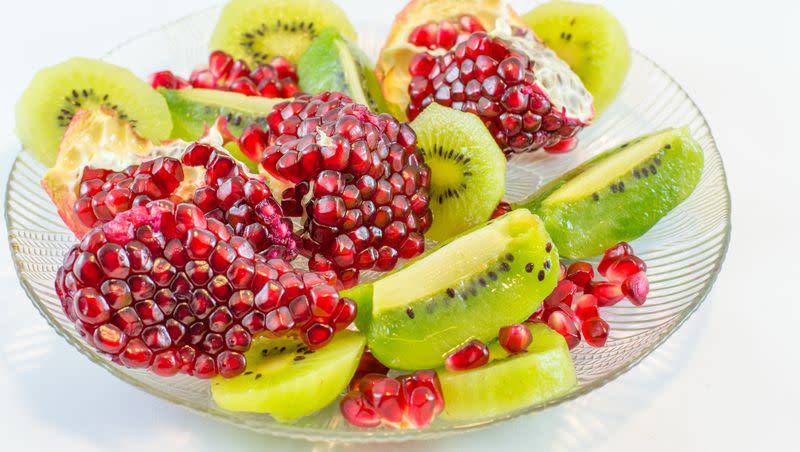10 winter season fruits and vegetables to add to your diet

You might think that when the cold weather hits and the farmers markets close for the season, the fresh produce also says goodbye till next summer. However, many fruits and vegetables reach their most fresh when winter comes around.
The distinction between winter and summer produce is that fruits and vegetables grown in winter are harvested in cooler conditions, allowing them to remain fresh for an extended period during the chillier months, according to The Gobble Blog.
“The vegetables that are in season during the winter are also much more flavorful than their summer counterparts,” the blog added. “Many people assume that when it’s cold outside, their produce options are limited, but in fact, winter fruit and vegetables are a great way to add a variety of flavors to your favorite dishes.”
What fruits are in season in the winter?
Many winter fruits are packed with essential vitamins, minerals and antioxidants. Eating fruits in their natural growing season ensures that you consume them when they are freshest and most nutritious. Here are five to add to your grocery list:
1. Grapefruit
“This winter fruit contains high levels of vitamin C, folate and fiber. Grapefruit is also a great source of antioxidants,” per Pressed Juicery. They can also benefit your immune system because of their richness in various vitamins and minerals essential for defending the body against infections.
2. Pomegranate
This unique-looking fruit is packed with ruby-red seeds called arils that are filled with nutrients. “Pomegranates are low in calories and fat but high in fiber, vitamins and minerals. Benefits include antioxidants, heart health, urinary health, exercise endurance and more,” according to Healthline.
3. Kiwi
Don’t let size fool you. These fruits may be small, but they are nutrient-dense and have a delicious tangy taste. “Kiwis are high in vitamin C and dietary fiber and provide a variety of health benefits,” Web MD shared. “This tart fruit can support heart health, digestive health, and immunity. The kiwi is a healthy choice of fruit and is rich with vitamins and antioxidants.”
4. Dates
A sweet and chewy option, often used in desserts or eaten dried. Dates are often used as a healthy sweetener to add into smoothies or yogurt. “The antioxidants, minerals and vitamins in dates help support brain, digestive, and heart health and protect against disease,” Per Health.
5. Persimmons
Perhaps a less popular fruit, but nutritious all the same, these unique fruits offer a sweet flavor that is often eaten fresh, like a peach or pear. Healthline emphasized that adding persimmons to your diet should be a given, “(They) promote heart health, reduce inflammation, support healthy vision, and keep your digestive system healthy.”
Related
What vegetables are good in winter?
Eating winter vegetables is crucial for maintaining overall health, especially during the colder months when the body’s need for immune support is higher.
1. Sweet potatoes
A popular food for its versatile cooking options. “Beneath their earthy jackets lie numerous nutrients, including high amounts of vitamin A, vitamin C, fiber and manganese,” according to Everyday Health. Also, adding sweet potatoes to your diet can benefit eyesight and blood sugar.
2. Turnips
This root vegetable can be mashed or roasted into your meals and have proven to support bone health. “Turnips contain calcium and vitamin K, essential nutrients for maintaining strong bones. ... The antioxidants in turnips (also) help reduce inflammation in the body,” per Relish.
3. Carrots
Easily one of the most favored vegetables to eat. Growing up, you were probably told that carrots help your vision, but these orange vegetables have many more benefits to them. “(Carrots) help maintain a well-functioning immune system, are important for our skin and healthy aging, and support our mucosal membranes in important areas like the respiratory system,” BBC Good Food shared.
4. Beets
These purple vegetables, associated with their earthy flavor, can be roasted, boiled or eaten raw. According to the American Heart Association, beets are great for boosting cardiovascular health: “Some studies show beetroot juice supplementation may lower blood pressure and increase blood flow. ... Beets also contain antioxidants, compounds in foods that help repair DNA and maintain good cell health, and they have antiinflammatory properties, reducing the risk for numerous chronic diseases.”
5. Parsnips
This often overlooked vegetable resembles carrots but has a sweeter/nuttier flavor. “The high fiber content of parsnips may help maintain regularity and reduce blood cholesterol levels. Parsnips also provide potassium and vitamin C and B6/Folate. They also boast anti-inflammatory properties and anti-fungal properties as well,” per Michigan State University.

